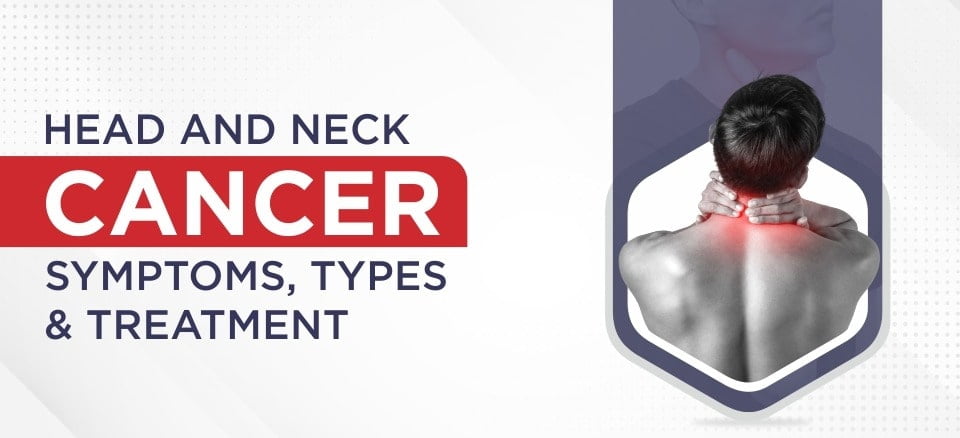Head & neck cancers are very common and affect hundreds of thousands of people each year. These are a group of cancers originating from the head or neck tissues.
These conditions impact the head, mouth, and throat, encompassing the nose, paranasal sinuses (sinus cavities), middle ear, oral cavity, and larynx (voice box), among other areas. It’s important to diagnose head & neck cancers as early as possible because they are common, recognizable, and often curable.
This blog looks at the most common types and symptoms related to head & neck cancers. Moreover, we discuss the available treatments for it in detail.
Types of Head and Neck Cancer
Head and neck cancers come in various types. They can be hard to differentiate because they look similar under a microscope and often have similar symptoms.
Head and neck cancers are often divided into groups depending on whether they affect the middle ear, nasal cavity, paranasal sinuses, oral cavity, tongue, salivary glands, throat or larynx (voice box).
The primary types of head and neck cancer are:
- Laryngeal cancer – affects the voice box (larynx).
- Tongue cancer – affects the tongue.
- Oral cavity cancer – affects the inside of your mouth (tongue, gums, lips and palate).
- Throat cancer – affects the throat (Pharynx).
- Oropharyngeal cancer – affects your tonsils and the back part of your mouth.
- Hypopharyngeal cancer – affects the throat’s lower part (usually known as the gullet).
- Salivary gland cancer – impacts the salivary glands located in your mouth and throat, including the parotid, submandibular, and sublingual glands.
- Nasopharyngeal cancer – affects the area at the back of your nose and upper throat (nasopharynx)
- Paranasal sinus cancer – impacts one or more of the air-filled cavities located behind the nose, known as paranasal sinuses.
- Ear cancer.
These cancers are most often seen in smokers and drinkers. Excessive alcohol consumption significantly raises the risk of developing head and neck cancer.

Head and Neck Cancer Symptoms
Patients with head and neck cancer commonly experience symptoms in the areas around the ears, throat, and nose. The condition may sometimes be tough to diagnose, as the symptoms can be mild or depict less critical diseases like flu.
Symptoms can differ based on the origin of the head and neck cancer, but commonly include:
- Hoarseness, cough and change in voice
- Head and neck cancers often present with lumps or swellings in the neck. They can look like a swollen gland under your chin, under an ear, under one side of your face or even inside your mouth, throat or nose. Swelling is often tender when touched.
- White or red patches in the mouth
- Trouble swallowing (dysphagia) and chewing
- Sudden weight loss
- Strange nasal discharge
- Difficulty breathing
- Pain in the neck and jaw, which can be constant or intermittent. The pain may be significant enough to make you wince when you turn your head or bend over. It may also radiate to your ears and cause ringing in the ears (tinnitus).
- Bad mouth odor
- Headaches
- Sore throat
- Nasal obstruction or frequent nosebleeds
- Face paralysis
- Pain in the ear(s) or difficulty hearing
- Blood in the saliva
- Double vision
- Loosening of teeth
- Ear infections
- Feeling numb of a body part in the neck & head area
- Fatigue
Diagnosing Head and Neck Cancer
Various tests can assist doctors in diagnosing head and neck cancer. A thorough medical history and physical examination are crucial. A physical exam includes scrutinising the nasal & oral cavities, throat, neck and tongue. Additionally, your healthcare provider can examine your lips, cheeks, neck, and gums for any lumps.
Other tests may include:
- Endoscopy enables your doctor to visualize inside your nasal cavity, throat, larynx, or other affected areas where symptoms are present. This is performed using an instrument called an endoscope (a thin tube with a light). Endoscopy is mostly painless.
- Staging tests are conducted to determine the extent to which cancer has spread to nearby lymph nodes or other parts of the body.
As part of your staging workup, your doctor may order imaging studies such as X-rays, CT scans or PET scans to look for signs of metastasis (spread). These imaging studies can also be used to monitor treatment response over time.
- A Tissue biopsy involves removing a small piece of tissue for examination under a microscope by a pathologist to detect cancer cells..
- Blood, urine or other body sample tests: Body samples/laboratory tests can help detect changes in the body that may be related to cancer.
Treatment for Head and Neck Cancers
Treatment for head & neck cancers depends on the location of the cancer, how advanced it is and other factors, such as genetics, overall health or age. The most common treatments for head and neck cancer include surgery, radiation therapy, chemotherapy and targeted therapy.
- Surgery is often the primary treatment choice for various types of head and neck cancers.Surgery may be able to remove all or part of a tumour by your surgeon. Your surgeon will also be able to observe whether any abnormal areas might have spread outside your tumor (metastasis).
If there are lymph nodes affected by the disease that were not visible on imaging tests before surgery (known as occult metastases), your doctor may recommend staging procedures for further evaluation. Additional testing after surgery to check for metastasis at other sites outside of those identified during staging procedures.
- Radiation therapy: It uses high-energy beams from machines outside your body (external beam radiation) or radioactive materials placed inside your body near where you have tumours (internal radiation).
Both radiation therapy and chemotherapy can alleviate pain from certain types of tumors. However, they can also lead to side effects like fatigue, as radiation may affect nearby healthy tissue where tumors are located.
- Chemotherapy is a treatment option for various types of head and neck cancers. It is frequently administered after surgery or radiation therapy to eliminate any residual cancer cells that may have survived those treatments.
Cancer cells grow and divide quickly. Chemotherapy works by slowing or stopping this process. It does this by damaging the DNA of cancer cells so they can’t grow or divide as fast as normal cells. This stops them from growing into new cancers and also helps kill off small numbers of them.
Early Detection is A Life-Saver in Head & Neck Cancers
If detected early, a complete cure is possible for head and neck cancer. On the flip side, the chances of survival decrease as cancer progresses. It’s important to know how to diagnose head & neck cancers as early as possible.
If you or someone you know has symptoms of head or neck cancer, it’s important that you get tested right away.
Head & neck cancer can be spotted early by getting regular screenings (like dental exams) and practising good hygiene in order to prevent the spread of the disease. You should also avoid smoking and alcohol consumption since both increase your risk of developing head & neck cancers.
If you notice any of the above-listed symptoms in yourself or someone you know, contact your doctor immediately.
Amandeep Medicity Hospital: World-Class Treatment for Head & Neck Cancer
Although not everyone will have direct experience with head and neck cancer, it is important for you to be informed about this type of cancer. If you experience any signs & symptoms or if they persist or worsen, be sure to see your doctor right away.
Head and neck cancer symptoms can be relatively subtle and easy to dismiss, but they deserve serious attention. The faster that cancer can be diagnosed and treated, the better the chances are for a full recovery.
The ENT Department at Amandeep Hospital offers a host of treatment options for various ear, neck & throat diseases, including cancer. Our proficient ENT Doctors provide accurate diagnosis and treatment using Otology, Rhinology, Head & Neck Surgery and more. So, if you are searching for the best ENT Surgeons in the region, Amandeep Medicity Hospital is the answer.
Book an appointment or visit us. Contact us today!



